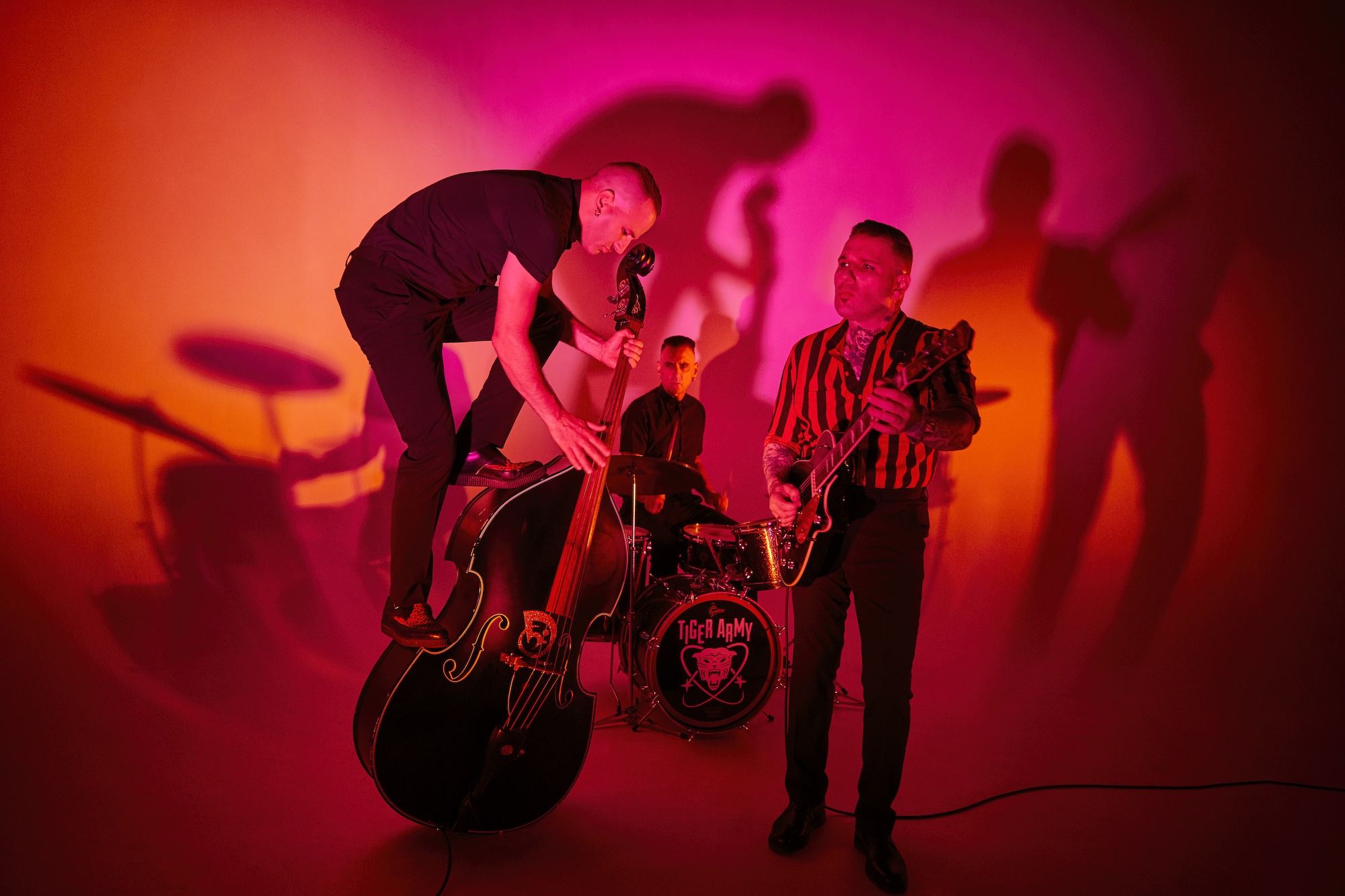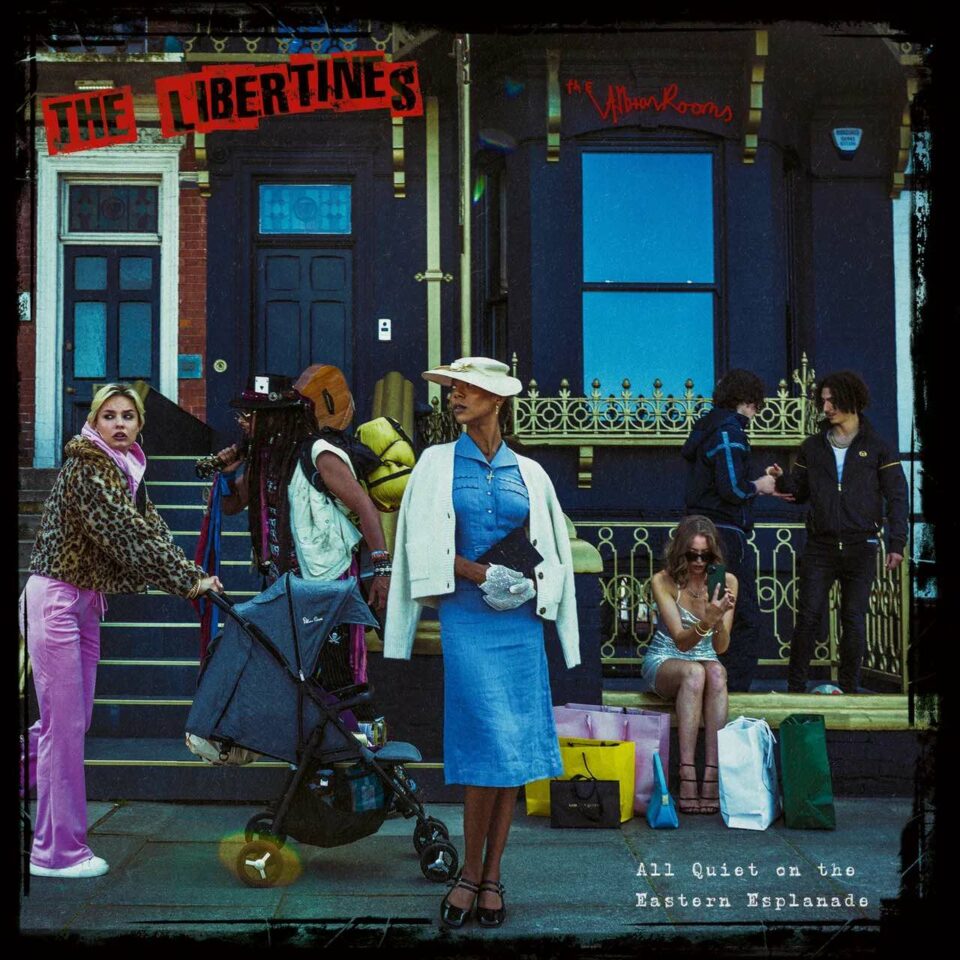Tiger Army are always growing. From the psychobilly and country influences of their two-decade-old debut to their more punk-oriented present iteration, the SoCal trio have spent their career absorbing new sounds which they’re able to integrate fluently into tidy, surf-wary tracks spanning six albums.
With their first release since 2016’s V, Nick 13 and his band (double-bassist Djordje Stijepovic and drummer Mike Fasano) tinker with the theme of retrofuturism, contemplating how punk-birthing genres of the ’50s and ’60s could benefit from the incorporation of more modern sounds. With listeners having plenty of time to absorb Retrofuture over the weekend, we asked Nick 13 to get us up to date on what he was listening to leading up to the recording of their latest collection of songs.
Retrofuture is available now via Rise Records. You can order it here.
Joe Meek & The Blue Men, “I Hear a New World”
An eccentric genius who ruled the pre-Beatles recording scene in early ’60s Britain while communing with the spirit of Buddy Holly prior to his own life ending in tragedy, the importance of Joe Meek’s production can’t be overstated when it comes to influence on the new Tiger Army album (or in general). While “I Hear a New World” isn’t the pop hit that “Telstar” was, it’s a great example of the effects that he pioneered—otherworldly echoes, delays, and even distortion. These now somewhat arcane techniques still sound incredibly fresh to my ears.
The Sentinals, “Latin’ia”
This song typifies the influence of Latin music on surf rock of the 1960s. Perhaps it was SoCal surfers’ penchant for surfing trips south of the border, or the general influence of Latin music on early-to-mid-’60s rock ’n’ roll, but this kind of song resonates with me as a guitar player and a listener. Dick Dale tread similar territory. Songs like this influenced “Prelude: Tercio De Muerte” on the new record, as well as the music for “Mi Amor La Luna.”
The Crystals, “Then He Kissed Me”
Girl groups (centering on, but definitely not limited to the stuff Spector produced) have long been an influence. The Ramones filtering their own very modern take on girl groups via distorted electric guitar is one example of the Retrofuture musical concept to me. Songs like this one definitely informed “Valentina”—even though the main riff is relatively sparse at the beginning, it builds toward the end to my (and producer Ted Hutt’s) guitar-based approximation of the Wall of Sound.
Suicide, “Cheree”
Punk is associated with the bombastic, which often overshadows the subtleties found in some of the progenitors, like Suicide. To do a clearly ’50s/’60s doo-wop influenced song, but with a stark, proto-Lynchian keyboard arrangement somehow typified what “retrofuture” meant to me as a musical concept rattling around in my brain.
Ernie Maresca, “Shout Shout (Knock Yourself Out)”
While Dion or The Elegants would be my go-to for melodic inspiration in the Italian-American Doo Wop that I grew up with from my dad (born and raised in the Brooklyn of that era), the loose, party atmosphere of this song was a touchstone for “The Past Will Always Be.”
Cramps, “New Kind of Kick”
I read a bio about the Cramps during the writing of the new album. After meeting in Sacramento, Lux and Ivy abruptly decamped to Ohio (allegedly to avoid legal trouble) prior to forming the band in New York City. While in Ohio, Ivy found a fuzz pedal in a pawn shop that was already a decade old in the mid-’70s. I tracked one down after a little research and “Devil That You Don’t Know” poured out immediately. This Cramps song typifies the fuzz and tremolo-soaked song I was chasing.
Motörhead, “No Voices in the Sky”
When I’d written the riff for “Sundown” and shown it to the rest of the band, it still needed a chorus. They really liked it and encouraged me to finish the song. For days, I constantly thought about what might work, until a chorus came to me while dreaming, just before I woke up one morning. I excitedly jumped out of bed and grabbed my guitar—only to find that the chorus didn’t fit “Sundown.” I knew it had to be a song regardless, and it became “Death Card.” The riff made me think of Motörhead, the more melodic side of the band that “No Voices” exemplifies, and that idea became an inspiration as “Death Card” developed.
Davie Allan & the Arrows, “Blues’ Theme (From The Wild Angels)”
This song, originally from the soundtrack of a ’60s biker exploitation flick, is one of my favorite features of a fuzz pedal. Fuzz was a big part of Retrofuture popping up on several songs, including “Sundown.” Listening to this definitely helped push things in that direction for me. It was one of the first major technical advances in guitar tone during the rock ’n’ roll era, yet sounds cutting edge in the computer era.
Discharge, “A Look at Tomorrow”
After an Americana solo album and Tiger Army’s work in recent years prior to Retrofuture, it’d been some time since I’d mined the territory of hardcore punk. Perhaps it was the tension of world events, but “Eyes of the Night” came to me and Discharge was definitely an influence. The brevity and their strange, haiku-like lyric structures were in my thoughts as the song took shape.
The Beatles, “Komm Gib Mir Deine Hand”
Hearing this in junior high fascinated me, and planted the seed that it would be cool to sing in another language—enter “Mi Amor La Luna” many years later. Spanish is the only language I have any experience with, and while I’m not fluent, I remembered much about the pronunciation from school—my friend and his cousin coached me on the rest. Early Beatles were also an influence on “Black Neon.”
The Housemartins, “The World’s on Fire”
I’ve always loved this style of UK pop. Echoes of songs like this, “Happy Hour,” or The Smiths can be heard in “Shadowlight” or the chorus of “Sundown” from the new album.









